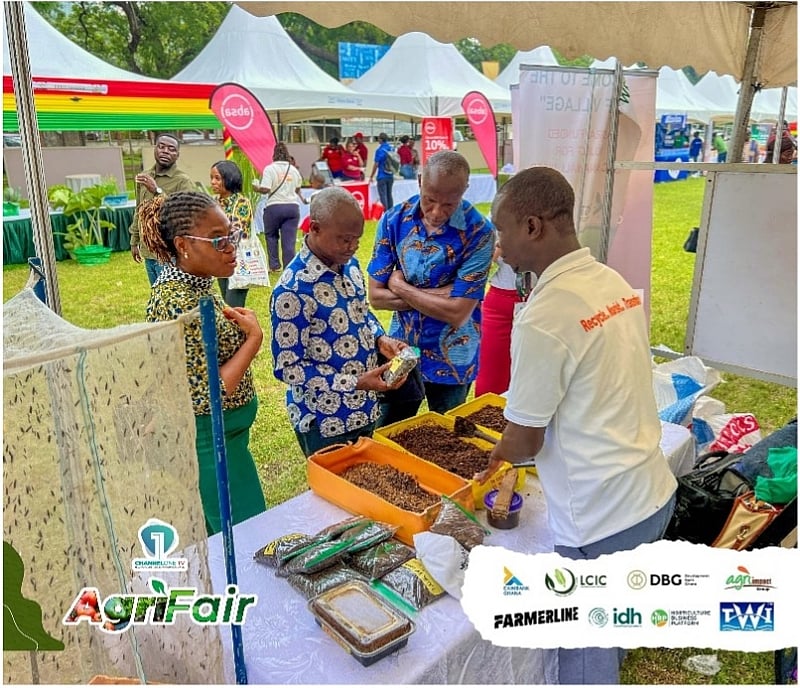The International Institute of Tropical Agriculture (IITA) spearheaded the Black Soldier Fly for Bio Circular Economy and Environmental Sustainability (BBEST) project, showcasing the transformative potential of Black Soldier Fly (BSF) technology at the Channel One TV AgriFair in Accra, Ghana. The event provided a platform to engage a diverse audience, including poultry, fish, and pig farmers, vegetable growers, potential investors, and the general public, emphasizing the multifaceted benefits of BSF farming for sustainable agriculture and environmental protection.
At the heart of the IITA BBEST exhibit was a live demonstration of the BSF life cycle, illustrating the process of converting organic waste into valuable resources. This innovative approach addresses several critical challenges facing modern agriculture, including the high cost of feed ingredients, waste management, and environmental sustainability. BSF larvae, rich in protein, offer a cost-effective alternative to traditional feed sources like fishmeal and soybean meal, potentially reducing reliance on imports and boosting profitability for livestock farmers. Furthermore, the utilization of organic waste by BSF significantly reduces the volume of material destined for landfills, mitigating greenhouse gas emissions and promoting urban sanitation.
The IITA BBEST team actively engaged with attendees, highlighting the economic and environmental advantages of BSF technology. They emphasized the potential for BSF farming to create employment opportunities, particularly for youth, while contributing to a more sustainable and resilient agricultural sector. The positive reception from farmers and potential investors underscores the growing recognition of BSF as a viable and impactful solution for addressing key challenges within the agricultural landscape. Many attendees expressed interest in receiving training on BSF farming, signaling a promising future for the adoption and scaling of this innovative technology.
Beyond larval production, the IITA BBEST project also showcased the value of BSF frass, a byproduct of BSF farming that serves as a high-quality fertilizer. Certified by the Plant Protection and Regulatory Services (PPRDS) under the Ministry of Food and Agriculture (MoFA), BSF frass offers a sustainable approach to soil enrichment and vegetable production. The exhibition of BSF frass at the AgriFair further broadened the appeal of BSF technology, attracting interest from vegetable farmers seeking environmentally friendly and effective fertilization methods.
The AgriFair facilitated valuable networking opportunities for the IITA BBEST project, fostering connections with key stakeholders in the agricultural sector. Mr. Daniel Fahene Acquaye, CEO of Agri-Impact, recognized the job creation potential of BSF technology and expressed interest in collaborating with the project. Similarly, the Ghana Prisons Service, represented by Agriculture Director Mr. Kwaku Ababio Ali, explored the possibility of integrating BSF farming into their rehabilitation and agricultural programs. This potential partnership highlights the versatility of BSF technology and its applicability across diverse sectors, contributing to food security and skills development.
Through its participation in the AgriFair, the IITA BBEST project successfully raised awareness about the benefits of BSF technology among farmers and feed producers. The event served as a catalyst for promoting BSF frass as a valuable agricultural input and facilitated the establishment of crucial partnerships with private and public institutions. These achievements pave the way for the wider adoption and scaling of BSF technology, ultimately contributing to the development of a more climate-smart and sustainable agricultural sector in Ghana. The project’s engagement with diverse stakeholders, from individual farmers to government agencies, underscores the potential of BSF farming to transform the agricultural landscape and drive positive change across multiple sectors. The positive response from attendees and the interest expressed in training and collaboration signal a promising future for BSF technology as a key driver of sustainable agricultural development.


